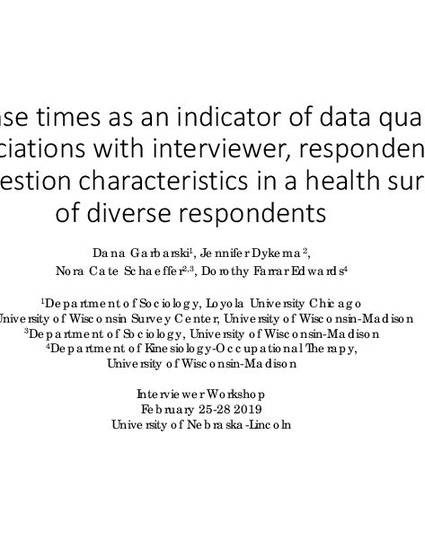
Presented at “Interviewers and Their Effects from a Total Survey Error Perspective Workshop,” University of Nebraska-Lincoln, February 26-28, 2019.
Survey research remains one of the most important ways that researchers learn about key features of populations. Data obtained in the survey interview are a collaborative achievement accomplished through the interplay of the interviewer, respondent, and survey instrument, yet our field is still in the process of comprehensively documenting and examining whether, when, and how characteristics of interviewers, respondents, and questions combine to influence the quality of the data obtained.
Researchers tend to consider longer response times as indicators of potential problems as they indicate longer processing or interaction from the respondent, the interviewer (where applicable), or both. Previous work demonstrates response times are associated with various characteristics of interviewers (where applicable), respondents, and questions across web, telephone, and face-to-face interviews. However, these studies vary in the characteristics considered, limited by the characteristics available in the study at hand.
In addition, features of the survey interview situation have differential impact on responses from respondents in different racial, ethnic, or other socially defined cultural groups, potentially increasing systematic error and compromising researchers’ ability to make group comparisons. As examples, certain question characteristics or interviewer characteristics may have differential effects across respondents from different racial or ethnic groups (Johnson, Shavitt, and Holbrook 2011; Warnecke et al., 1997).
The purpose of the current study is to add to the corpus of existing work to examine how response times are associated with characteristics of interviewers, respondents, and questions, focusing on racially diverse respondents answering questions about trust in medical researchers, participation in medical research, and their health participation. Data are provided by the 2013-2014 “Voices Heard” survey, a computer-assisted telephone survey designed to measure respondents’ perceptions of barriers and facilitators to participating in medical research. Interviews (n=410) were conducted with a quota sample of respondents nearly equally distributed into across the following subgroups: white, black, Latino, and American Indian.
Available at: http://works.bepress.com/dana-garbarski/34/

Copyright 2019 by the authors.